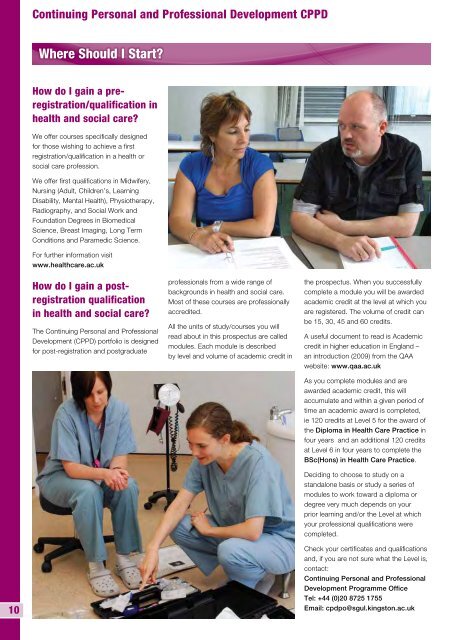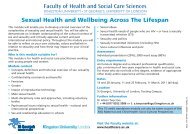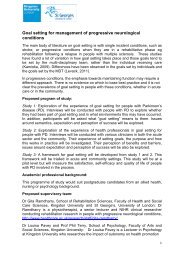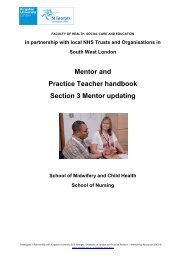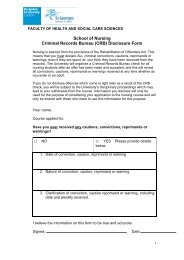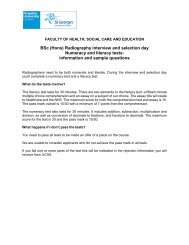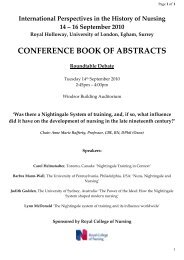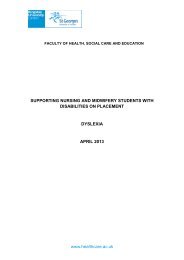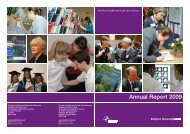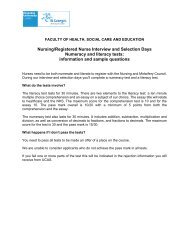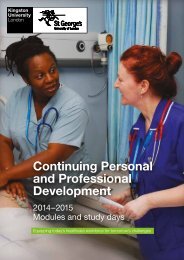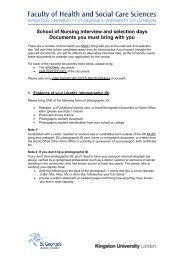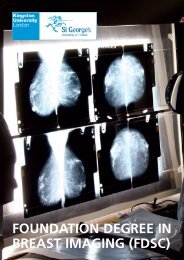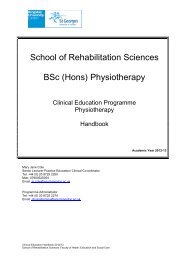Where Should I Start? - Faculty of Health, Social Care and ...
Where Should I Start? - Faculty of Health, Social Care and ...
Where Should I Start? - Faculty of Health, Social Care and ...
You also want an ePaper? Increase the reach of your titles
YUMPU automatically turns print PDFs into web optimized ePapers that Google loves.
Continuing Personal <strong>and</strong> Pr<strong>of</strong>essional Development CPPD<strong>Where</strong> <strong>Should</strong> I <strong>Start</strong>?I already have a Diploma<strong>of</strong> Higher Education,what should I do next?How do I continuemy studies at thehighest level?12If you have a Diploma <strong>of</strong> HigherEducation, you can build on this byaccumulating academic credit at Level6 <strong>and</strong> then complete the compulsorymodule ‘Developing Practice (HonoursDegree project)’ for 30 credits to gain aBSc(Hons) <strong>Health</strong> <strong>Care</strong> Practice.An ordinary degree is unclassified <strong>and</strong>if you pass you will be awarded a BSc<strong>Health</strong> <strong>Care</strong> Practice. To complete thisaward you can accumulate the 120credits at Level 6 by selecting modulesthat will suit your current practice <strong>and</strong>development without having to undertakethe compulsory research module.What if I have a healthor social care honoursdegree from the UnitedKingdom – at what levelshould I study?You can decide to access modules ateither Level 5 or Level 6. Accumulating120 credits at Level 5 will lead to apost-qualifying Diploma in <strong>Health</strong> <strong>Care</strong>Practice <strong>and</strong>/or Practice Specific Award.The award <strong>of</strong> a degree is made up <strong>of</strong>120 credits at Level 5 <strong>and</strong> 120 credits atLevel 6 as demonstrated in the diagramon page 11.If you prefer to study modules on ast<strong>and</strong>alone basis at Level 6 you may beable to use this academic credit to applyfor a masters programme. It is possibleto use academic credit at Level 6 to claimexemption from studies at Level 7.If you choose to study your modulesat Level 6 this will not lead to anotherdegree.I already have a degreein a health or social carerelated subject fromanother country– what should I do next?As long as this degree is equivalent to theUK qualifications framework above youcan access modules at either Level 5 orLevel 6. Contacting the Admissions Tutorin advance is advisable: s.heatley@sgul.kingston.ac.uk.You can make direct contact to NARIC– www.naric.org.uk. This organisationwill assess your qualifications <strong>and</strong> provideyou with a statement. This can be usefulfor your information <strong>and</strong> pr<strong>of</strong>essionalportfolio.You will need to provide transcripts inEnglish <strong>and</strong> the original certificates <strong>of</strong>awards you have obtained. This will thenbe assessed before deciding on where tobegin your level <strong>of</strong> studies.How do I study atpostgraduate level?A higher degree called a masters degreeis normally made <strong>of</strong> 180 credits at Level7. Each <strong>of</strong> the programmes <strong>of</strong>fer differentamounts <strong>of</strong> exemption depending onwhat the programme requires <strong>of</strong> you.See page 98 for details <strong>of</strong> the coursesavailable. Some postgraduate modulescan also be taken on a st<strong>and</strong>-alone basis,<strong>and</strong> the modules available are listed aftereach full programme <strong>of</strong> study.If you wish to continue your studies atthe highest Level – Master <strong>of</strong> Philosophy(MPhil), Doctor <strong>of</strong> Philosophy (PhD) orMaster <strong>of</strong> Science by Research <strong>and</strong>Dissertation (MSc Res) – then please referto the Research Degrees (see Section Cpage 159) where you can get informationon finding a supervisor <strong>and</strong> how toregister.How do I gainAccreditation <strong>of</strong>Prior Learning (APL)?Accreditation <strong>of</strong> prior learning (APL) is anopportunity to be given credit for learning<strong>and</strong> skills already gained before joiningone <strong>of</strong> the <strong>Faculty</strong>’s courses. This meansthat you can avoid duplicating previouslearning <strong>and</strong> it can help you to:• Gain entry into a course even if youdon’t have some <strong>of</strong> the requiredqualifications• Be exempt from certain parts <strong>of</strong>the course• Progress more quickly towardsqualifying for the final awardFor example, you may have alreadystudied individual modules or shortcourses or gained a relevant qualificationat another institution this is expressedas Accreditation <strong>of</strong> Prior CertificateLearning (APCL). Or you may haveachieved relevant learning through workexperience, volunteer work, or as part<strong>of</strong> a training course for which you didn’treceive any formal qualification – knownas Accreditation <strong>of</strong> Prior ExperientialLearning (APEL).You can only be awarded credit forprior learning that matches the learningoutcomes <strong>of</strong> the course that you areplanning to study. This could be done onthe basis <strong>of</strong> individual modules or for anentire Level or stage <strong>of</strong> the course.
Continuing Personal <strong>and</strong> Pr<strong>of</strong>essional Development CPPD<strong>Where</strong> <strong>Should</strong> I <strong>Start</strong>?How do I apply for APL?Each course has specific policies abouthow much APL can be allowed towardsa qualification or towards exemption fromparts <strong>of</strong> the course.You will need to provide evidence <strong>of</strong> yourprior learning. For prior qualifications thismay be a certificate, transcript, formalletter, or pass list. If your learning isexperiential then you will need to producea portfolio <strong>of</strong> evidence to demonstratethat you have met the learning outcomes<strong>of</strong> the module <strong>and</strong> Level for which you areseeking credit. Applicants undertakingCPPD modules towards the Diploma/BSc <strong>Health</strong> <strong>Care</strong> Practice will be directedto access the Work-Based Modules onpage 87 if they are considering APL.APL Key ContactsIf you think you are eligible for APL <strong>and</strong> would like to find out more, please contact the APL advisor for the course youare interested in:Advanced Practice MScSue HeatleyE: s.heatley@sgul.kingston.ac.ukT: 020 8725 2285M: 07880 786 775Biomedical Science FdScCathy PriceE: c.price@sgul.kingston.ac.ukT: 020 8725 0203Exercise for <strong>Health</strong> MScAhmed YounisE: a.younis@sgul.kingston.ac.ukT: 020 8725 0972<strong>Health</strong> care Education <strong>and</strong>Clinical Leadership MScMaria PontoE: m.ponto@sgul.kingston.ac.ukT: 020 8417 5712M: 07990 704 842<strong>Health</strong> <strong>Care</strong> Practice Dip/BScSue HeatleyE: s.heatley@sgul.kingston.ac.ukT: 020 8725 2285M: 07880 786 775Long Term Conditions FdScAhmed YounisE: a.younis@sgul.kingston.ac.ukT: 020 8725 0972Midwifery <strong>and</strong> child healthMidwifery BSc(Hons)Lynne Cornford-WoodE: l.cornford-wood@sgul.kingston.ac.ukT: 020 8725 2238Maternal <strong>and</strong> Child <strong>Health</strong>Socio-Cultural Perspectives MScAlison Twycrossa.twycross@sgul.kingston.ac.ukT: 020 8725 0379M: 07785 525 986NursingNursing DipHE/BSc(Hons)Rosemary CastleE: r.castle@sgul.kingston.ac.ukT: 020 8417 5446M: 07795 283 709Paramedic ScienceSue CoppardE: s.coppard@sgul.kingston.ac.ukT: 020 8725 2361M: 07880 786 771RadiographyBreast Imaging FdScJudi CurtisE: judi.curtis@sgul.kingston.ac.ukT: 020 8417 2504Undergraduate radiographyTony DennisE: a.dennis@sgul.kingston.ac.ukPostgraduate radiographyHansa Jadva-PatelE: h.jadva-patel@sgul.kingston.ac.ukT: 020 8417 2898Rehabilitation Undergraduate<strong>and</strong> MSc RehabilitationAhmed YounisE: a.younis@sgul.kingston.ac.ukT: 020 8725 0972<strong>Social</strong> WorkJane LindsayE: j.f.lindsay@sgul.kingston.ac.ukT: 020 8417 509613


